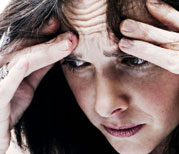Emotional Wellness
Each meridian is associated with an emotion. The Liver meridian is associated with anger, Heart with joy, Spleen with worry, Lung with grief, and Kidney with fear. If the body’s energy is balanced and in harmony, then the emotions are also in balance. If the emotional energy is imbalanced it can also present as physical symptoms. Pulse diagnosis is one of the many assessments that are taken to analyze where there are emotional imbalances and discomfort. Integrative Japanese Acupuncture is then used to balance those energies.
Our moods, emotions, mental thought processes, and a substantial part of daily health are determined by neurotransmitters. There are 100’s of chemicals that are neurotransmitters or neuromodulators. Every part of the body is connected by neurons that carry the signal of neurotransmitters. These signals regulate all the actions of the various systems in the body. Neurotransmitters are used to communicate commands to all the systems. If that communication is disrupted then there is dysfunction leading to disease.
Neurotransmitter imbalance accounts for many clinical problems. The most widely discussed is serotonin deficiencies and its role in depression. But there needs to be balance between all excitatory and inhibitory neurotransmitters for proper functioning of the mind and body. Many times antidepressants don’t work because there is too much emphasis on just serotonin instead of analyzing its role in the overall imbalance. By providing the body with an increased supply of the precursors to neurotransmitters it will increase the body’s ability to synthesize its own supply of transmitters and can correct neurotransmitter imbalances.
The Neuroendocrine Connection
Hormones also play a tremendous role in establishing emotional wellness. The role of sex hormones in brain function is multifaceted and influences the actions of multiple neurotransmitters. An assessment of the hormonal balance always needs to be done.
At Integrative Japanese Acupuncture and Wellness Center the goal is to provide an overview of neurotransmitter and hormonal balance through testing and then to optimize and rebalance the pathways and meridians.
Clinical Condition and neurotransmitter-related symptoms:
The Integrative Japanese Acupuncture and Wellness Center currently uses Neuroscience testing of neurotransmitters and hormones. We use “Targeted Amino Acids Therapy” and precursors to the neurotransmitter pathways to bring harmony and balance.
Integrative Approach: Managing of Depression
Individuals can develop an imbalance of neurotransmitters in the brain such as serotonin, Dopamine, GABA, which can cause the following symptoms:
Testing Levels and Treatment
Symptoms alone do not identify an imbalance in brain chemistry. Using a urinary lab test, patient’s levels of all the neurotransmitters can be assessed and an appropriate therapeutic protocol can be designed using “Targeted Amino Acid Therapy” developed by Neuroscience Labs.
Acupuncture and Depression
Clinical trials show that acupuncture has similar response rate in the treatment of clinical depression as those patients treated with antidepressant medication. It is clear that acupuncture has far fewer side effects. Acupuncture’s unique advantage is that it can work rapidly. Someone who is severely depressed cannot wait the two to three weeks that it takes an antidepressant medication to work.
Diet and Exercise
There are numerous scientific studies that document the value of physical exercise on the treatment of depression. Some studies even show that exercise can work as well as psychotherapy or medication for clinical depression. The important part of this is that the exercise needs to be done regularly. Sometimes the depressed have a hard time self-motivating to do exercise. This is when wellness counseling helps.
When a person is depressed, there are foods that are beneficial and foods that should be avoided. Over stimulating foods like coffee often over amp the adrenals leading to fatigue and anxiousness. Sugar also does not help depression though both of these foods are often used to boost energy because of lethargy. A diet is designed for each individual using their pulse diagnosis and their neurotransmitter test results.
The patient will also be given supplements and vitamins to help with depression and anxiety.
At Integrative Japanese Acupuncture and Wellness Center we offer strategies to address not only the disease but also design a holistic approach so that the patient can work with all their physicians to achieve optimal health.


